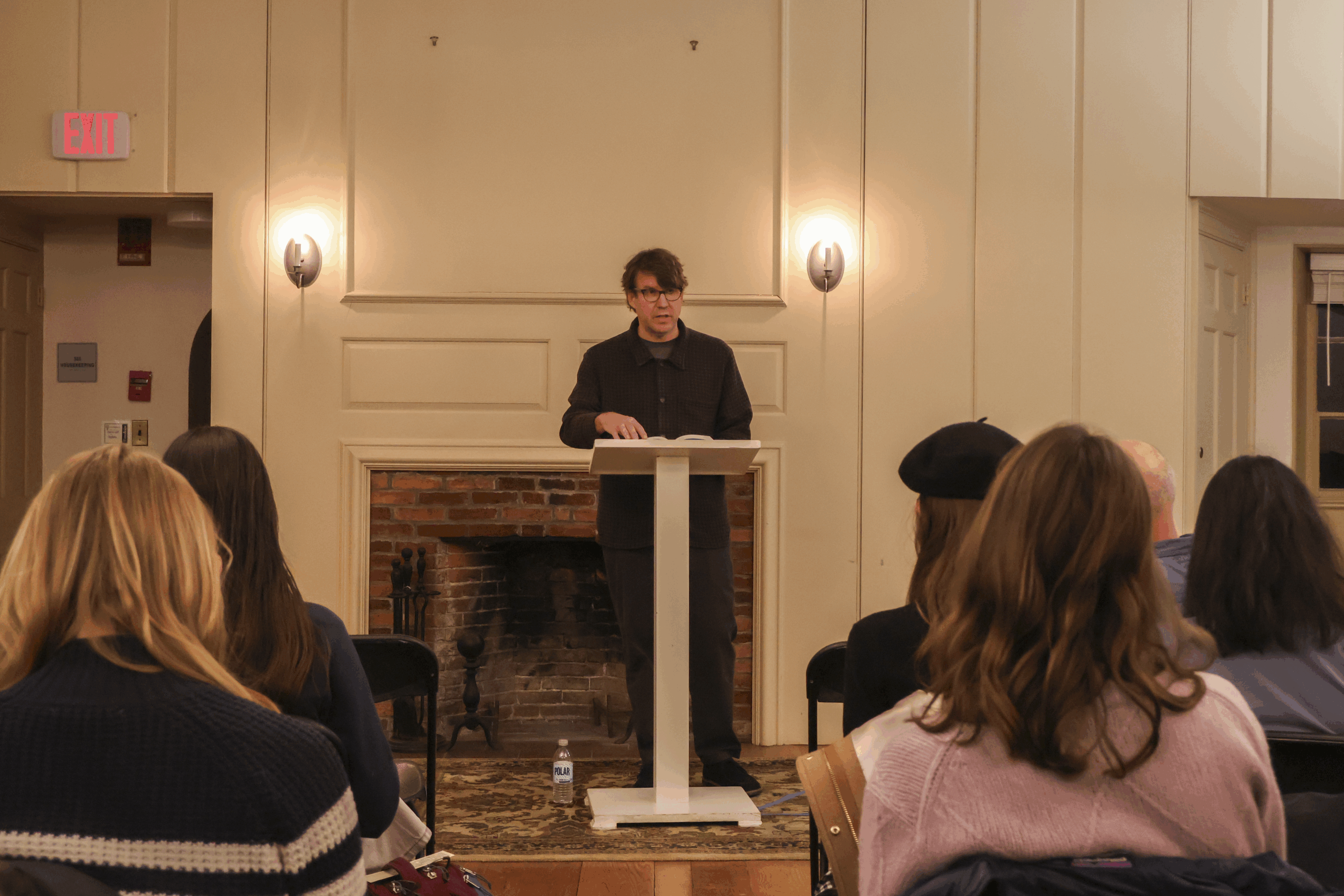Moffett discusses fatherhood and humor in new novel
November 14, 2025
 Abigail Hebert
Abigail HebertOn Wednesday, students, faculty and community members gathered in Massachusetts Hall for a reading with author Kevin Moffett. Moffett is an assistant professor of creative writing at the University of Virginia. The visit was organized by Professor of English Brock Clarke and was funded by the Alpha Delta Phi Literary Society.
Moffett is the author of two published short story collections. Clarke highlighted Moffett’s importance in the literary world as an author largely focused on short stories.
“[Moffett’s] been, for a long time, one of our best short story writers, a writer who’s focused on that rather than just doing it when he’s not doing longer projects,” Clarke said.
In addition to his short story collections, Moffett released his debut novel, “Only Son,” in 2025. The novel follows a man who, while struggling to connect with his son, retraces his father’s past through a found travel journal. It has been long listed for the National Book Award.
Clarke highlighted Moffett’s unique style in the novel.
“I don’t think he views any subject as sacred,” Clarke said. “There’s a lot of supposedly inappropriate humor in the novel…, and he brings that sensibility to bear on things like fatherhood, family [and] mortality.… Comedy often disarms readers…. Then they’re more open to a genuine sense of sadness and grief and loss in the novel, which then sits side by side with the comedy.”
Following a reading from “Only Son,” Moffett took questions from the audience, reflecting on the novel’s significance in his journey as a writer.
“I didn’t write autobiographically ever until this novel. I don’t write about young narrators,” Moffett said. “This is a young narrator, an autobiographical novel. I think that’s the book that I was equipped to write now. I couldn’t have written this book when I was a student or anywhere near [when] any of this stuff happened.”
Moffett also discussed the novel’s composition of short scenes and reflected on his commitment to short-form work.
“I just have a desire to write shorter and shorter paragraph stories, much more fragmented things. I wanted to write a whole book of 400-word stories,” Moffett said. “So a lot of these pieces are condensed even further down from that, or they grew out of the sentences that were in that shorter section … it’s from a desire to not let a scene slowly simmer for five, ten or 20 pages. It’s, in some ways, a kind of challenge to myself to try to get it on a postage stamp.”
Clarke saw Moffett’s visit as a source of inspiration and a window into the writing process for students.
“I think it’s always helpful to demystify the process of writing, and one way to demystify it is to meet the people who are actually doing it so that you recognize that it’s not just geniuses separate from the culture, from the society, [but] geniuses … whose lives resemble our own,” Clarke said. “I think that’s encouraging for students: for younger writers to want to make a living out of this.”
Clarke also saw the reading as a way for students to develop their writing.
“They [might] see the writer, and something about the writer’s personality or style or delivery opens up something for them,” Clarke said. “It might then affect their own work, stylistically, in terms of voice, in terms of plot.”
Overall, Clarke views author visits as a way for Bowdoin students to expand their education beyond the classroom.
“Bringing people from outside of campus onto campus is always good. It lets a little air in. It’s very easy to become obsessed with what one is surrounded by, and these visiting writers aren’t that. I think it allows students to remember college isn’t only about what’s going on in your classes. It is about people coming in from the outside who are working in fields that you’re interested in,” Clarke said.
Clarke also emphasized how these readings help connect students with a broader community.
“It also provides a sense of community. Community members come to the readings too. So it’s a good way for college people and Brunswick people, or Portland people or Maine people to be at the same event. It’s a community in that way,” he said.

Comments
Before submitting a comment, please review our comment policy. Some key points from the policy: